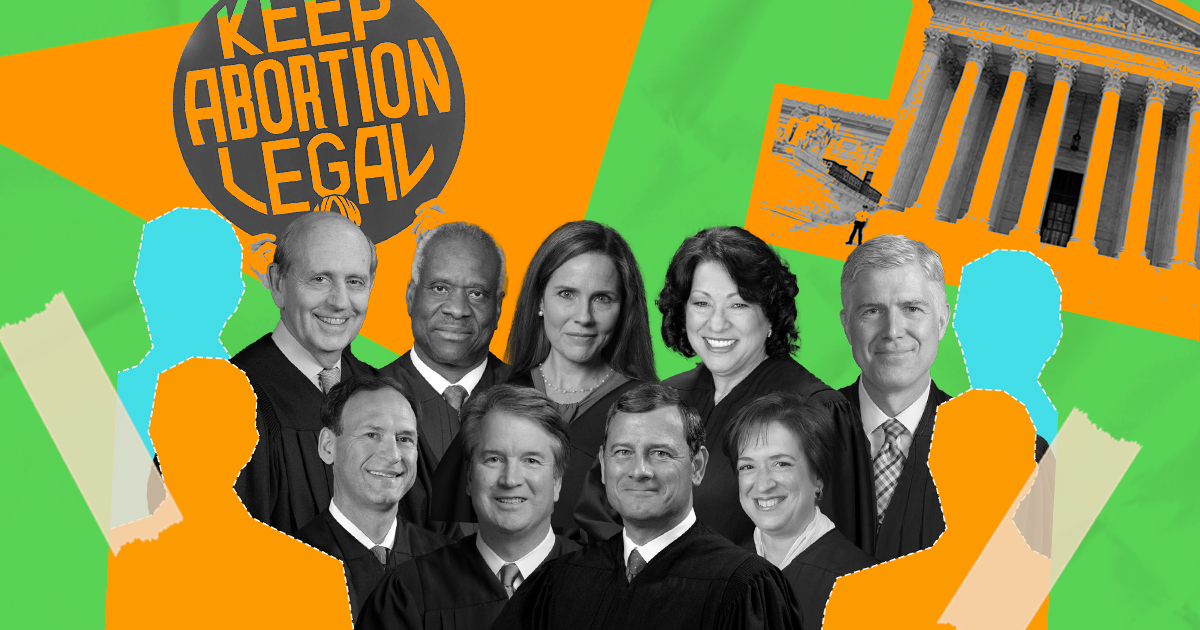We talked to Sonja Spoo About the Fight to Protect Abortion Access Through Court Reform

We’re here to talk about something that has been in the headlines and hits close to home for us: the Supreme Court’s threat to abortion access.
For decades, conservatives have worked hard to roll back a pregnant person’s right to an abortion, and now the 6-3 right-wing supermajority that sits on the Supreme Court today poses an existential threat to reproductive rights.
On December 1, the court heard oral arguments on Dobbs v Jackson Women’s Health, a consequential abortion case whose outcome could dramatically reduce access to abortion. This case is just one more reason why we need every member of our community ready to take action to help pass the Judiciary Act, important legislation to rebalance this out-of-touch Supreme Court.
We spoke with Sonja Spoo from UltraViolet to learn more about the fight and how we can plug in.
What is UltraViolet, and what’s your role there?
UltraViolet is a feminist advocacy organization that is fighting for a more inclusive world that accurately represents all women. We work to end violence against women, increase economic security for women and families, and—most important for this conversation—ensure that all women have access to full and affordable health care services, including abortions.
As the Director of Reproductive Rights Campaigns at UltraViolet, I generate and oversee campaigns aimed at defending access to reproductive freedom. My job is all about harnessing UltraViolet’s grassroots power and turning it into real political and social change.
Situate us in this moment. What is happening to reproductive freedoms in America right now?
I’ll be honest, this is a tough moment for reproductive rights in America.
As of October, states across the country had passed 106 laws restricting access to abortion in 2021. This is totally unprecedented.
One law that garnered national outrage is Texas’ SB 8. It has made abortion virtually inaccessible for pregnant people in the state. And especially dangerous, the law creates a bounty system where Texans can sue anyone, anywhere who helps a person get an abortion after 6 weeks and they can potentially collect $10,000 if their suit is successful, creating a financial incentive for regular Texans to enforce the ban. This could be as broad as the Uber driver who takes someone to an appointment. Texas also thinks this is a clever workaround to judicial review by abdicating state law enforcement responsibility to everyday people.
Is this part of a larger trend, and who is most impacted by these restrictions?
We can’t ignore that since 2010, abortion access has been under increasing, coordinated attack. In many parts of the country, people of color, poor people, young people—they don’t have meaningful access to abortion care. We’ve seen restrictions like multi-day waiting periods, laws that require people to come back to a clinic several times before they can have an abortion, passed across the country. People have to take days off work, figure out childcare, gas money, hotels, and so on. And then pay for the procedure itself.
Think of the costs that add up having to jump through all those hoops! Unfortunately, many private insurers don’t cover abortion care. And because of the Hyde Amendment, a federal budgetary provision that bans federal money from going towards abortions, neither does Medicaid or other federal insurance programs. If you live paycheck to paycheck, as so many Americans do, abortion care can be incredibly costly due to these bans and restrictions.
How is the Supreme Court involved—and why should we be concerned?
The Supreme Court is hearing oral arguments to decide whether SB 8 and another law from Mississippi that directly challenges Roe v. Wade are constitutional—and given the makeup of the court we are extremely worried about the outcome of these cases.
The right to an abortion is settled law, so we should read their willingness to hear these cases as an intention to weaken or overturn Roe.
For decades, conservatives have been working to appoint right-wing justices that would overturn Roe. Now that Amy Coney Barett, Neil Gorsuch, and Brett Kavanaugh sit on the bench—all Trump appointees—the court has a 6-3 conservative supermajority. The makeup of this court doesn’t reflect America’s diversity or its politics. A majority of Americans support legal abortion! And yet the court is poised to significantly weaken or even strike down Roe’s nearly 50 year precedent.
We should be concerned because access to an abortion is a fundamental right, inextricably tied to our social, political, and economic liberation. This isn’t up for debate. Chances are you know someone who has had an abortion, and if you think you don’t—you probably do. This issue impacts millions and millions of people. Abortion is health care. Period.
How can we help rebalance the court and make it less conservative? What can we (our readers) do about it right now?
It might feel like we’re powerless to fight back against this radically conservative Supreme Court, but we’re not.
Democrats in the House have introduced the Judiciary Act, which would add four more seats to the Supreme Court bringing the number of justices that sit on the bench to 13. This would go a long way towards rebalancing the court away from dangerous and extreme right-wing ideology and back toward its function to protect our rights.
Passing this legislation won’t happen overnight, but it’s our best shot at rebalancing the court and protecting our fundamental rights from this 6-3 supermajority on the bench.